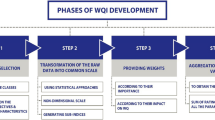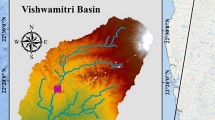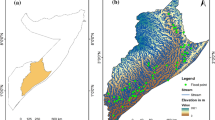Abstract
Worldwide, many rivers experience serious water deficiency to such a degree that artificial water recharge is the only option for their ecological restoration. In this contribution, we present a framework for comprehensively evaluating multi-objective scenarios to support decision-making for effective river ecological restoration by artificial recharge. First, we developed an evaluation index system, comprising eight typical evaluation indices, to allow a comprehensive assessment of river ecological restoration. A multi-level and stepwise weighting method was then proposed to determine the final weights of those different evaluation indices for calculating and achieving the overall objective of river ecological restoration. Finally, a comprehensive framework was developed in two steps. First, we integrated the proposed index system and the weighting method using a principal component projection approach. We then tested the proposed framework in a case study to support decision-making for the ecological restoration of the Yongding River using artificially recharged and recycled water. The case study demonstrated that the comprehensive evaluation index system was rational, and verified the advantages and feasibility of the proposed weighting method. In particular, it indicated that the proposed framework was reasonable and effective for evaluating river ecological restoration with artificial river recharge. It was also capable of identifying optimal restoration scenarios from a range of scenarios generated by the newly developed decision-support system.

Similar content being viewed by others
References
Agarski B, Budak I, Kosec B, Hodolic J (2011) An approach to multi-criteria environmental evaluation with multiple weight assignment. Environ Model Assess 22:1–12
Buchanan BP, Walter MT, Nagle GN, Schneider RL (2012) Monitoring and assessment of a river restoration project in central New York. River Res Appl 28(2):216–233
Chambal S, Shoviak M, Thal AE Jr (2003) Decision analysis methodology to evaluate integrated solid waste management alternatives. Environ Model Assess 8(1):25–34
Chen WP (2011) Reclaimed water reuse experiences in California and hints to China. Chin J Environ Eng 5(5):961–966
Chen K, Jarboe K, Wolfe J (1981) Long-range scenario construction for technology assessment. Technol Forecast Soc Chang 20(1):27–40
Cheng J L, Shi Z, Li Y, Yang D Z, Li H Y, Zhu Y W. 2005. Assessing environmental quality of agricultural soils using GIS and multivariate analysis in Zhejiang Province, China. Environmental Informatics Archives(3): 427–434
Costanza R, d’Arge R, de Groot R,Farber S, Grasso M, Hannon B, Limburg K, Naeem S, O’Neill R V,Paruelo J, Raskin R G, Sutton P, van den Belt M. 1998. The value of the world’s ecosystem services and natural capital. Ecological Economics25(1):3-15(13)
Daniel SE, Tsoulfas GT, Pappis CP, Rachaniotis NP (2004) Aggregating and evaluating the results of different. Ecol Indic 4:125–138
Dovers S R, Norton T W, Handmer J W. 1996. Uncertainty, ecology, sustainability and policy. Biodiversity and Conservation 1143–1167 (5)
Hobbs RJ, Harris JA (2001) Restoration ecology: repairing the earth’s ecosystems in the new millennium. Restor Ecol 9:239–246
Hughey KFD (2013) Development and application of the river values assessment system for ranking New Zealand River values. Water Resour Manag 27(7):2013–2027
Jakeman AJ, Letcher RA (2003) Integrated assessment and modelling features, principles and examples for catchment management. Environ Model Softw 18:491–501
Kay JJ, Regier AH. 2000. Uncertainty, complexity, and ecological integrity: insights from an ecosystem approach. Implementing Ecological Integrity: 121–156
Koebel JW Jr, Jones BL, Arrington DA (1999) Restoration of the Kissimmee River, Florida: water quality impacts from canal backfilling. Environ Monit Assess 57(1):85–107
Kondratyev S. 2003. A system for ecological and economic assessment of the use, preservation and restoration of urban water bodies: St Petersburg as a case study: 327–366
Li MY (2000) Principae components projection. Appl Stat Manag 20(5):45–48
McKnight US, Funder SG, Rasmussen JJ, Finkel M, Binning PJ, Bjerg PL (2010) An integrated model for assessing the risk of TCE groundwater contamination to human receptors and surface water ecosystems. Ecol Eng 36:1126–1137
Nakamura K, Tockner K, Amano K (2006) River and wetland restoration: lessons from Japan. Bioscience 56(5):419–429
OECD (1994) Environmental indicators. OECT, Paris
Peng T, Wu JZ, Jiang GH (2010) Study on River ecological function regionalization of Yongding River in Beijing. China Popul Resources Environ 20(9):134–139
Poudevigne I, Alard D, Leuven RSEW, Nienhuis PH (2002) A systems approach to river restoration a case study in the lower Seine Valley, France. River Res Appl 18:239–247
Prasad AG (2012) Carlson’s trophic state index for the assessment of trophic status of two Lakes in Mandya district. Adv Appl Sci Res 3(5):2992–2996
Purcell AH, Friedrich C, Resh VH (2002) An assessment of a small urban stream restoration project in Northern California. Restor Ecol 10(4):685–694
Rogiers B, Johan L, De Bie E, Batelaan O (2011) Evaluating the impact of river restoration on the local groundwater and ecological system: a case study in NE Flanders. Geol Belg 14(3–4):265–276
Saaty TL (1977) A scaling method for priorities in hierarchical structures. J Math Psychol 15(3):234–281
Singh A, Panda SN (2013) Optimization and simulation modelling for managing the problems of water resources. Water Resour Manag 27(9):3421–3431
Stewart TJ, Scott L (1995) A scenario-based framework for multicriteria decision analysis in water resources planning. Water Resour Res 31(11):2835–2843
Walsh CJ, Fletcher TD, Ladson AR (2005) Stream restoration in urban catchments through redesigning stormwater systems: looking to the catchment to save the stream. J N Am Benthol Soc 24(3):690–705
Walz R (2000) Development of environmental indicator systemsexperiences from germany. Environ Manag 25(6):613–623
Wan L, Chen YQ, Tan J, Guo B, Yang AQ (2009) Variation of ecosystem services value in the suburbs of Beijing based on the land use change. Areal Res Dev 28(4):94–99
Weinstein PW (2007) Linking restoration ecology and ecological restoration in estuarine landscapes. Estuar Coasts 30(2):365–370
Weng SQ, Huang GH (2010) An integrated scenario-based multi-criteria decision support system for water resources management and planning-A case study in the Haihe River Basin. Expert Sys Appl 37:8242–8254
Xu WJ, Xu SG (2008) Entropy weight comprehensive health index method for assessment of lake ecosystem health. Res Soil Water 15:125–127
Yang J P, Ding Y J , Chen R S (2003) The Chinese water resource:managing increasing demand and natural variations. Water Resources System-Hydrological Risk, Management and Development (Proceedings of symposium HS02b held during IUGG2003 at Sapporo,July). IAHS Pbul: 341–348
Zhang KQ, Zhang HS, Ning AR, Wang N, Li JX, Han LB (2005) Application and development of green land irrigation by municipal reclaimed water at home and abroad. J Agro-Environ Sci 24(S1):384–388
Zhou HL, Shi PJ, Xu XL (2003) A study on urbanization process and changes of water environment in shenzhen city. J Beijing Norm Univ (Natural Sci) 39(2):273–279
Acknowledgements
This study was funded by Major State Basic Research Development Program of China (973 Program) (No. 2010CB428801& No. 2010CB428804), The State Environmental Protection Public Welfare Projects (No. 201309003), Beijing Key Science and Technology Program (No. D09040903700801), and The Key National Science & Technology Resources Project (No. 2011ZX05060-005).
Author information
Authors and Affiliations
Corresponding author
Rights and permissions
About this article
Cite this article
Yu, S., Wang, M. Comprehensive Evaluation of Scenario Schemes for Multi-objective Decision-making in River Ecological Restoration by Artificially Recharging River. Water Resour Manage 28, 5555–5571 (2014). https://doi.org/10.1007/s11269-014-0822-9
Received:
Accepted:
Published:
Issue Date:
DOI: https://doi.org/10.1007/s11269-014-0822-9




